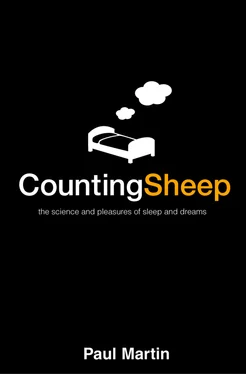Exhausted people are very poor at making sound judgments based on complex information, including information derived from their own knowledge, beliefs and experience. Sleep-deprived prisoners are therefore much more susceptible to persuasion that their actions or beliefs are wrong. Herein lies the secret of ‘brainwashing’.
In the Korean War of 1950–53, the Communists tortured American and Allied prisoners of war by systematically depriving them of sleep. A constant succession of guards would interrogate a prisoner at random times throughout the day and night, subjecting him to a constant barrage of questions and arguments. The effects on prisoners’ behaviour and beliefs were often profound. Sixty per cent of the US airmen who were captured in the Korean War either confessed to imaginary crimes, such as using biological weapons, or collaborated with the enemy in condemning the USA. When the prisoners were eventually returned to the USA, the US government appointed a panel of experts to discover what had happened. The assumption at the time was that the Communists must have subjected the Allied prisoners to some mysterious and sophisticated form of mind control. Either that, or the men must be traitors and cowards. But the evidence uncovered by the review panel ruled out drugs, hypnosis or other forms of novel trickery. The truth was more prosaic. Just one device had been used to confuse and torment the prisoners until they were ready to confess to anything. That device was prolonged sleep deprivation. A combination of fatigue, confusion, fear and loss of control had produced profound changes in the men.
The practice of sleep-depriving military prisoners continues to this day. In April 2001 a US military surveillance aircraft collided in midair with a Chinese fighter. The American plane was forced to make an emergency landing in China. Meanwhile, the Chinese plane crashed, killing the pilot. The Chinese authorities were not happy: they impounded the American plane along with its crew of 24, sparking a diplomatic row between the two nations. The crew were eventually released after being detained and questioned for 11 days. They later revealed that the Chinese had used sleep deprivation as part of the interrogation process. The American pilot reported that the Chinese had questioned him for several hours on the first night, and thereafter had repeatedly woken him at various times of the night and day, forcing him to snatch a little sleep whenever he could.
Prolonged sleep deprivation lay behind many of the psychiatric casualties of World War One. Thousands of men had to be withdrawn from the horrific conditions of the front line with what was referred to then as shell shock. (Nowadays we would call it post-traumatic stress disorder.) Continuous shelling was undoubtedly a cause of severe stress. For hours or days at a time, men crouched defenceless in muddy trenches, constantly exposed to the threat of instant death or injury but powerless to do anything about it. Even the hardiest of minds could crack. But the shelling broke men for another reason as well: it prevented them from sleeping. Doctors often found that when a man with disabling shell shock was granted respite from the front line, he would rapidly recover and be able to return to his unit within days. Getting a few nights’ sleep in the hospital probably did more good than the psychotherapy that went with it.
When we starve ourselves of sleep in the name of work or play, we go partway down a path that leads eventually to something horrific.
Sleep is that golden chain that ties health and our bodies together.
Thomas Dekker, The Guls Horn Book (1609)
We have seen some of the bad things that sleep deprivation does to our minds. What does it do to our bodies? Sleep and physical health are intimately intertwined, which means that inadequate sleep can cause all sorts of physical problems. When sleep deprivation is taken to the extreme, death ensues. Some scientists have argued that many of us neglect or mismanage our sleep to the extent that it damages our health, and that large numbers of people around the world die prematurely every year because of undiagnosed and untreated sleep disorders.
What, then, is the scientific evidence that sleep impinges on our physical health? Some (admittedly crude) indicators point towards a link between poor sleep and poor physical health. For instance, people who are sleepy during the day are more likely to use healthcare. And older people who complain of poor sleep are at greater risk of a heart attack. One American study that tracked thousands of elderly people discovered that individuals with sleep problems were more likely to suffer a heart attack over the following three years.
Lack of sleep and the resulting daytime tiredness are associated with greater sickness absence from work. An investigation of absenteeism among French employees found that those who reported feeling very sleepy at least three days a week were more than twice as likely to take sick leave as their less sleepy colleagues. Sleep problems are also predictive of long-term work disability. Norwegian research found that adults who were experiencing mediocre or poor sleep were more than twice as likely to face long-term work disability a few years later. People who sleep badly also tend to eat badly, which may contribute to their health problems.
Good sleep, on the other hand, fosters mental and physical health. Psychological wellbeing, physical health and longevity are all statistically associated with healthy lifestyle practices, one of which is good sleep. The lifestyle factors associated with a lower risk of dying prematurely include taking physical exercise, not smoking and getting seven or eight hours of sleep a night. For example, recent research that investigated longevity in Japanese people uncovered three important factors, each of which was independently linked with a reduced risk of dying. These factors were walking for at least one hour a day, ikigai (a sense that your life is meaningful), and sleeping for at least seven hours a night. There is even some tentative evidence that people who habitually go to bed early live longer. A study of people aged over 80 found that these long-lived individuals all reported having gone to bed early throughout their lives. However, retrospective evidence of this sort must always be taken with a large pinch of salt. (But not too much salt, because that would be unhealthy.)
At the other extreme, excessive sleep is also linked statistically with poor health – probably because sleeping for unusually long periods is often a sign of illness. Scientists discovered in the 1970s that people whose normal nightly sleep duration was either unusually short (less than four hours) or unusually long (more than nine or ten hours) had a higher than average risk of dying prematurely. Similarly, a study of elderly British people found that those who spent 12 or more hours a day in bed had a significantly higher mortality rate, while those who spent the proverbial eight hours a day in bed had the lowest mortality rate.
Excessively long sleep is often a consequence of heart disease or other medical conditions, so it would be a mistake to generalise this finding very far. There is no reason to suppose, for example, that sleep-deprived teenagers or exhausted adults who lie in bed at the weekends will die younger as a consequence of snatching a few extra hours of rest. Too much sleep can make you feel temporarily below par, however. Experiments have confirmed that healthy people who normally feel refreshed after eight hours of sleep tend to feel groggy and perform badly after they have slept (on request) for 10 or 11 hours. On the other hand, how many healthy adults routinely sleep for 10 or 11 hours at a time? Few of us have any reason to fret about the dangers of sleeping too much.
Читать дальше












